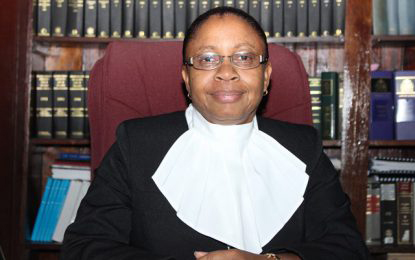One of the two petitions filed by the main opposition APNU+AFC challenging the results of the March 2nd 2020 polls has been dismissed because its presidential candidate David Granger was not served on time but the other one will proceed and timelines were yesterday set for it.
Following a ruling in just over two hours yesterday afternoon, Acting Chief Justice Roxane George-Wiltshire SC has also ordered that documents in possession of the Guyana Elections Commission (GECOM) from the March 2nd, 2020 elections not be destroyed before the remaining petition is fully heard and determined.
Specifically, the Chief Justice has ordered that all Statements of Poll (SOPs) and Statements of Recount (SORs) be physically lodged with the Registrar of the Supreme Court for “safe keeping.”
Finding that former President Granger was a necessary party to both petitions, Chief Justice George-Wiltshire threw out the second petition lodged on behalf of the coalition because service was not effected on him within the statutory period.
The judge said that having found the first petition to have been served on Granger within the stipulated timeframe, that petition would be preserved and therefore heard.
Regarding the first petition, attorney Roysdale Forde who represents those petitioners has until February 12th to file and serve his submissions, and the respondents then have until March 5th to respond.
Any further responses are then to be filed by March 19th and the matter is returnable to court for April 7th.
Petitioners Monica Thomas and Brennan Nurse in the second petition which had been described as the trial-petition—requiring witnesses and the leading of evidence, were contending that the elections were unlawfully conducted and/or that the results, (if lawfully conducted), were affected or might have been affected by unlawful acts or omissions. They nonetheless argue that from those polls it is Granger who should be declared the duly-elected President of Guyana.
They were seeking to have the court nullify the outcome and to declare President Irfaan Ali to be illegally holding office.
In the first petition, petitioners Claudette Thorne and Heston Bostwick want the court to determine among other things, questions regarding whether the elections have been lawfully conducted or whether the results have been, or may have been affected by any unlawful act or omission and in consequence thereof, whether the seats in the National Assembly have been lawfully allocated.
Dismissing the contention advanced by attorneys for petitioners—Thomas and Nurse, the Chief Justice said that there was compelling evidence to support the respondents’ argument that Granger was not served with the petition on time.
The judge said that both the affidavit of service and the return of service documents produced by these petitioners were inconsistent. She noted that while there was sufficient time within which the petitioners could have brought to the attention of the court what they described as a genuine mistake in recording the date of service, no effort was made to so do.
In fact, the judge pointed out that from the evidence, it was not until counsel for the respondents and the Attorney General raised the issue with the court that the errant petitioners at that point sought to make the case of a mistake.
Justice George-Wiltshire said that contrary to the arguments advanced on behalf of the petitioners, it is not only the affidavit of service on which the court must rely for the date of service, but rather the return of service as well, and all supporting documents which form part of the whole.
On this point the judge made it clear that the petitioners could not simply approbate and reprobate by advancing evidence on which it relies, and then when confronted with weaknesses in that evidence say that it no longer relies on that evidence by attempting simply to explain it away, especially when the explanation itself cannot be substantiated as has been their plight.
The judge said the counsel for the petitioners “failed miserably” in trying to explain their “grave mistake” which is without merit.
The court noted that while the petition ought to have been statutorily served on Granger on or before September 21st, 2020; this was not done until September 25th, and that when the issue was raised by the respondents, the petitioners then said that Granger had actually been served on September 18th but that he had mistakenly recorded the date as September 25th.
The affidavit of service on which the petitioners wanted the court to rely had September 18th recorded. The return of service, however, was dated September 25th.
The judge pointed out that while indeed human errors are possible, the explanation proffered by the petitioners was not only farfetched, but highly improbable that Granger would have recorded a date so far into the future.
The petitioners’ explanation then that Granger had actually signed the document on September 24th but recorded a date later was still not countenanced by the court which pointed out that in any event, to have signed the document on September 24th was still out of the statutory period.
Referencing a plethora of case law authorities, the Chief Justice said that the timeframe for service of petitions is not only extremely important in election cases, but must be strictly complied with, as non-compliance can be fatal to the petition itself.
The judge noted, too, that the court has no jurisdiction to grant an extension of time where service is out-of-time.
Unlike the position of the petitioners in both petitions, the Chief Justice found that in accordance with case law precedent, Granger as the leader of the list of candidates for A Partnership for National Unity and Alliance For Change (APNU+AFC) is a necessary party to the proceedings.
Having found him to have been served within time in the first petition, however, the judge said that that petition can go forward.
She said that simply issuing a notice that he does not which to contest the petitions does not make him an unnecessary party. In fact, the court said that it is an acknowledgement of being a necessary party that one issues such a notice.
She said that in accordance with law, a person such as Granger who is the head of a list of candidates has, in the proceedings, at least an interest which conflicts with reliefs being sought by the petitioners and/or contentions of the petitioners and so it would be important for that person to be heard, thus making them a necessary party; and more so since the interest of everyone on that list may be affected also.
Following her ruling, the Chief Justice granted a request made by attorney Kashir Khan who represents the Citizenship Initiative—one of the dozen respondents in the petition, for all documents concerning the elections to be preserved.
Khan said that while the statutory period for the destruction of such material looms, it would be prudent that they be preserved given that the petition is still to be heard. He had asked for the court to take possession of all the relevant documents.
While the judge made the order, she had said that the court would not take physical possession of the documents since they were voluminous and the court hadn’t the physical storage facilities to accommodate the documents.
Khan, however, asked the court to take possession of the SOPs and SORs as together they would not be too onerous on the court to find facilities to store them as opposed to having to store all the election documents.
The judge acceded to Khan’s request.
The results of a national recount of all ballots cast showed that it was the PPP/C which had won the elections with 233,336 votes over the 217,920 which the coalition managed to secure.
Arguing on behalf of the petitioners in both matters, Trinidadian senior counsel John Jeremie had previously advanced that contrary to arguments made by the attorney general and attorney for PPP/C General Secretary Bharrat Jagdeo—respondents in the matters, service of the petition was effected within time and so the petitions should not be dismissed.
He had contended, too, that Granger was not a necessary party to the petitions and so they cannot be thrown out even if service was effected on him out of time—though Jeremie’s contention was that Granger was served on time.
Jagdeo’s lawyer Douglas Mendes SC of Trinidad had, however, argued that because the second petition was served late on Granger whom he contended was a key party to the proceedings in both matters, both petitions ought to be thrown out.
Jeremie had sought to argue that Granger was served within the prescribed time while crediting what he described as the “confusion” with the date of service to clerical errors and had urged the court to rely on the affidavit of service on which he said the correct dates had been annotated as the evidence of service, and not the return of service document.
Mendes’ argument had been, however, that because Granger was a necessary party to the two petitions late service of the requisite documents on him was fatal to both petitions and they must therefore be thrown out.
Attorney Basil Williams SC who represents Granger had, however, refuted that his client was key to the proceedings and had stated further that they would abide by whatever ruling the court makes.








